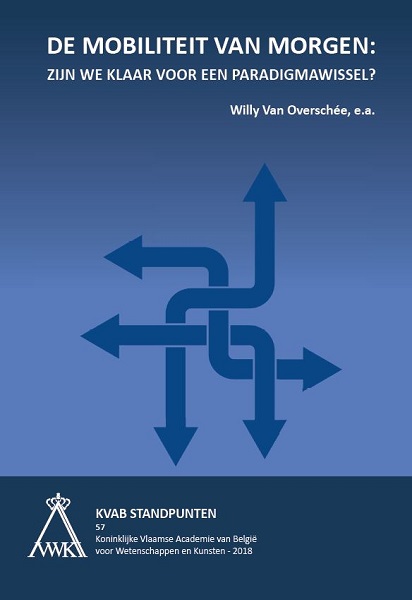The mobility of tomorrow: are we ready for a paradigm shift?

The issue of mobility is a complex multidimensional problem and requires an urgent approach, also related to the expected increase in both personal travel needs and an increase in freight transport. The current approach is mostly observed and experienced from a focus on fast sub-solutions, whereby additional infrastructure works are carried out, sometimes at the expense of the necessary attention for the existing resources and their maintenance.
The basic issue must solve the apparent paradox between an efficient travel need of the individual user and the fragmentation of the means used to meet this need. This should take into account a background of an extreme existing density of the road network, the fragmented urbanization in our regions and a public transport offer that, at best, partially addresses these challenges.
Various approaches are reviewed with attention to people and the
environment, new technological and systemic tendencies and their impact
on the social context and organization.
Three key recommendations are
unambiguously signed:
-
Open Governance
The transition to a new mobility requires a broad cooperation between and an active role of science, policy, industry and society. Fundamentally, creating a "platform" to facilitate an overarching vision of mobility with all involved participants. At the same time, this function can also explore new developments (Mobility as a Service, self-driving vehicles, Internet of Things) through test projects on the interplay of road pricing with the concept of shared mobility: how should the different modes of transport be charged in order to stimulate the right means of transport at the right level?
-
Open Data
Digitization offers opportunities, but at the same time potential dangers are surfacing: who has which data, which power is in their hands? Many of the data on mobility are available in a fragmented way with different parties, and not always for the participants of a model in which each party has its role to play and in which the government(s) determine the rules of the game in function of the desired social added value. Clear contracts, where the data must be shared with the government, and the possibility to adjust the services in the future are important. The accessibility of all available mobility data of all and / or new players for the aforementioned platform must be guaranteed at all times.
-
A focal point strategy for shared mobility
A much better link with spatial planning and an area-oriented approach are needed with the definition of a specific mobility policy and accessibility through the definition of nodes. Via these nodes, as many activities as possible can be clustered. From these clusters, transports can be organized in a maximally bundled way. This way the goods mobility can be channeled and made more sustainable. In addition to an active cluster policy, an active corridor policy can also be implemented. The mobility of the future presents us with the task of designing the slower changing space and infrastructure in such a way that they steer the rapidly changing technological developments in the desired direction. The proper functioning and localization of those nodes is consequently unduly necessary to realize the necessary transitions in the use of the various modes of transport. people to make the switch to public transport. The role of the government is to monitor solidarity in order to keep those basic needs and the emancipatory effect of access to work, education, ... open to everyone. The above strategy can of course only be realized if there is close cooperation between all stakeholders in the mobility debate. Via an integrated vision of mobility and spatial planning an objective description of the situation can be drawn up, leading to an envisaged densification and hierarchical structure of the total network at various levels (region, region, municipality, ...).
Available documents
Author
-
Denis De Bruyne
-
Koen Kerckaert
-
Julie Mabilde
-
Cathy Macharis
-
Alex Van Breedam
-
Valentin Van den Balck
-
Willy Van Overschée
-
Yvan Verbakel
-
Bart Vannieuwenhuyse


